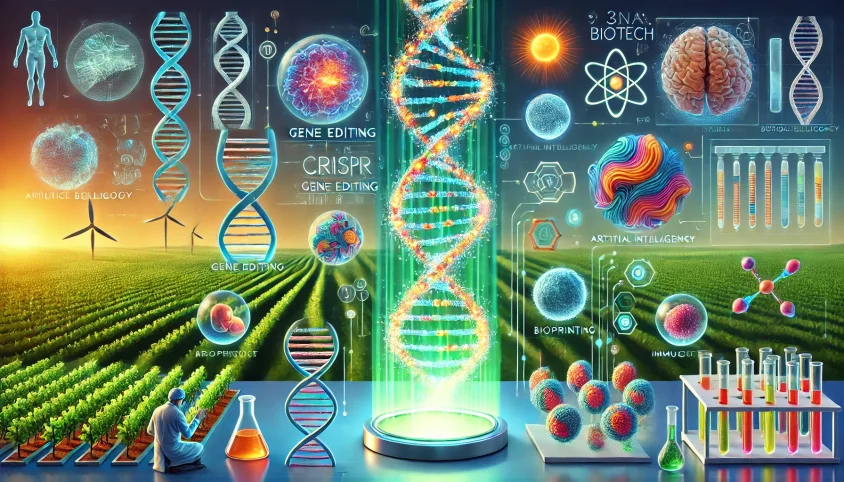Revolutionizing the Future: The Latest Trends in Biotechnology - 2025

Biotechnology is a rapidly evolving field at the intersection of biology and technology, revolutionizing industries ranging from healthcare to agriculture. As we move further into the 21st century, breakthrough innovations are driving unprecedented advancements. Below, we explore the most transformative trends reshaping biotechnology today.
1. CRISPR and Gene Editing: Precision Like Never Before
The CRISPR-Cas9 system has redefined genetic engineering by providing unparalleled precision in gene editing. Recent developments in CRISPR technology include:
Prime Editing: Offering enhanced accuracy in correcting genetic mutations.
Base Editing: Allowing single nucleotide changes, reducing the risk of off-target effects.
Applications range from curing genetic disorders like sickle cell anemia to improving crop resistance against pests and environmental stress.
2. Synthetic Biology: Engineering Life
Synthetic biology combines engineering principles with biology to design and build biological systems. Key advancements include:
Biofoundries: High-throughput facilities for rapid prototyping of biological systems.
Artificial Cells: Development of synthetic cells capable of performing specific tasks like drug delivery.
The rise of synthetic biology is fostering innovation in biomanufacturing, biofuels, and even space exploration.
3. Artificial Intelligence (AI) in Biotechnology
AI is transforming the way we analyze biological data, with applications such as:
Drug Discovery: Accelerating the identification of potential drug candidates.
Protein Folding: Tools like AlphaFold have solved one of biology’s biggest puzzles.
Personalized Medicine: AI models are enabling customized treatment plans based on individual genetic profiles.
4. Organoids and Lab-Grown Tissues
Organoids—miniaturized and simplified versions of organs grown in vitro—are becoming vital tools for:
Disease Modeling: Replicating human diseases for drug testing.
Regenerative Medicine: Growing tissues and organs for transplantation.
The ability to mimic complex human systems is opening new avenues in precision medicine and pharmacology.
5. Bioprinting: 3D Printing Meets Biology
Bioprinting is advancing rapidly, with the capability to:
Print Tissues and Organs: Developing functional tissues for research and transplantation.
Customized Implants: Creating tailored solutions for individual patients.
With innovations in bio-inks and materials, bioprinting is moving closer to making organ shortages a thing of the past.
6. Green Biotechnology: Sustainability at Its Core
Biotechnology is playing a crucial role in addressing environmental challenges through:
Bio-based Plastics: Developing biodegradable alternatives to traditional plastics.
Carbon Capture: Engineering microorganisms to sequester atmospheric CO2.
Agricultural Advancements: Creating crops that require less water and fertilizers, reducing ecological footprints.
7. Immunotherapy: Revolutionizing Cancer Treatment
Immunotherapy continues to transform oncology, with emerging trends such as:
CAR-T Cell Therapy: Engineering patient’s immune cells to target cancer.
Neoantigen Vaccines: Personalizing cancer vaccines based on tumor-specific antigens.
These therapies are offering new hope to patients with previously untreatable cancers.
8. Microbiome Engineering: Unlocking the Potential of Microbes
Understanding and manipulating the human microbiome is becoming a focal point in:
Probiotic Therapies: Designing microbes to treat gastrointestinal and metabolic disorders.
Agricultural Microbiomes: Enhancing soil health and crop yields through tailored microbial solutions.